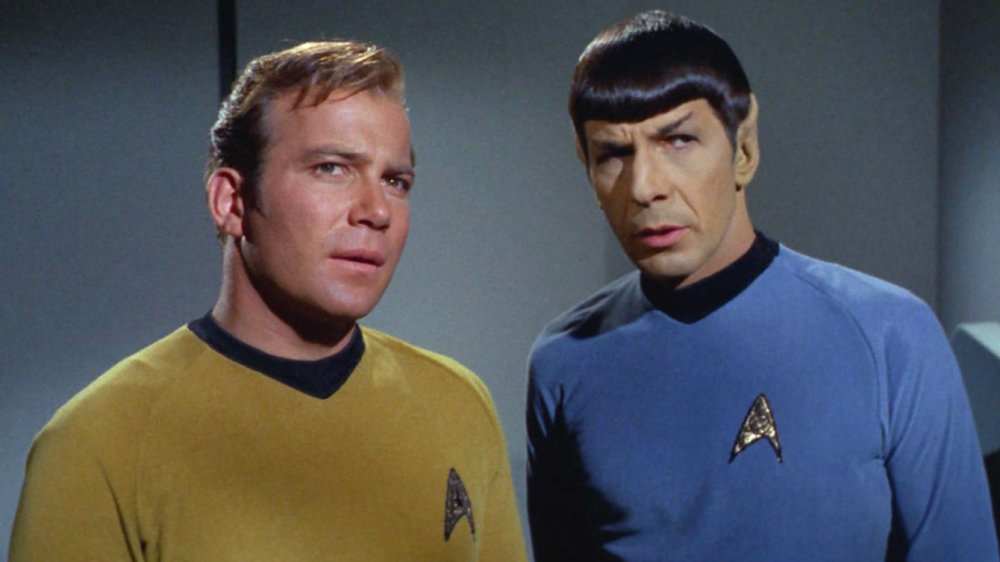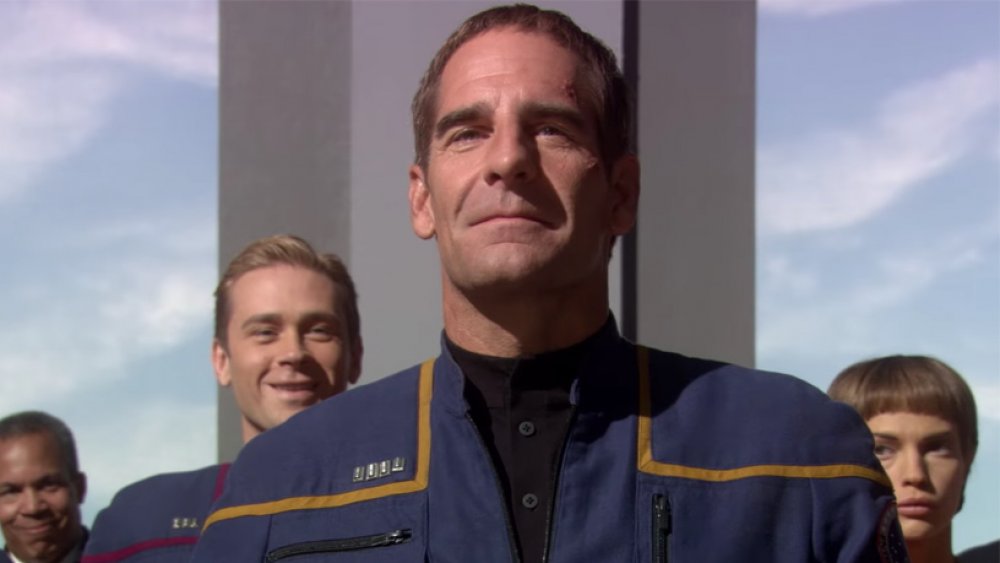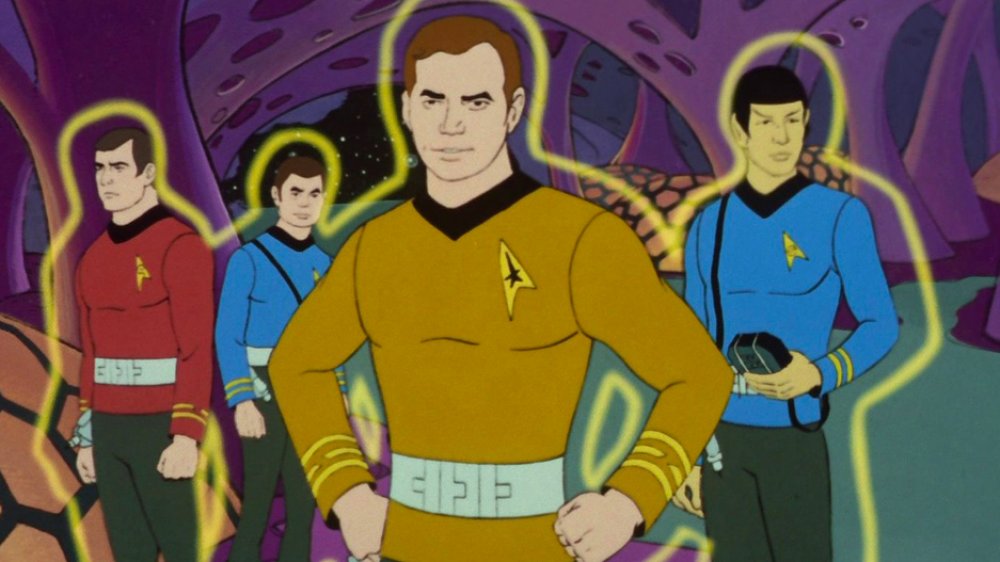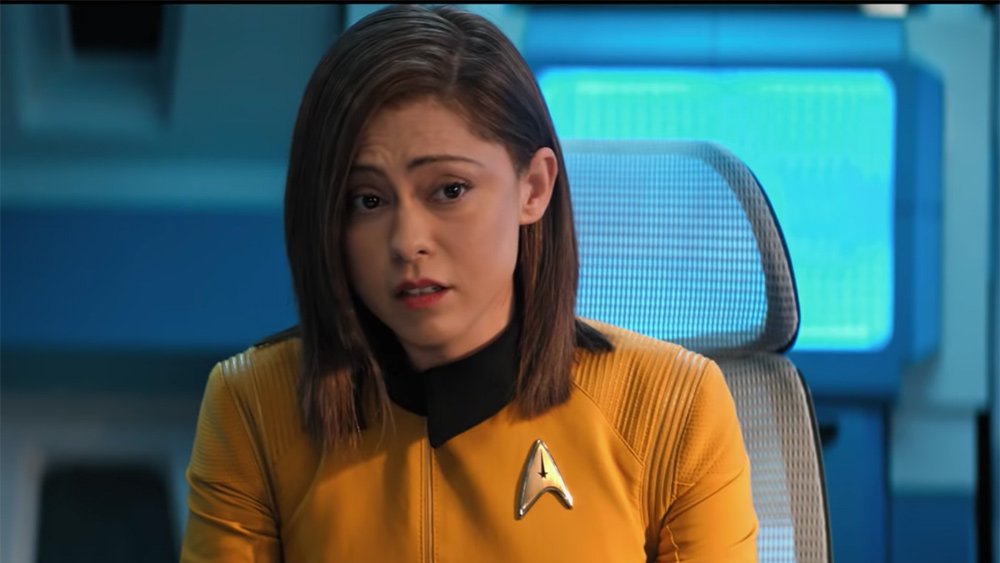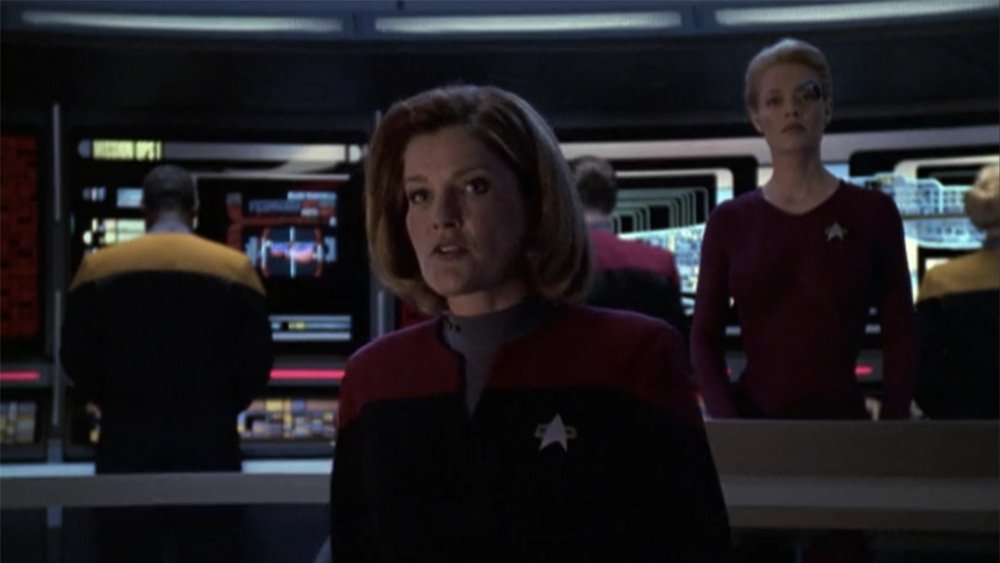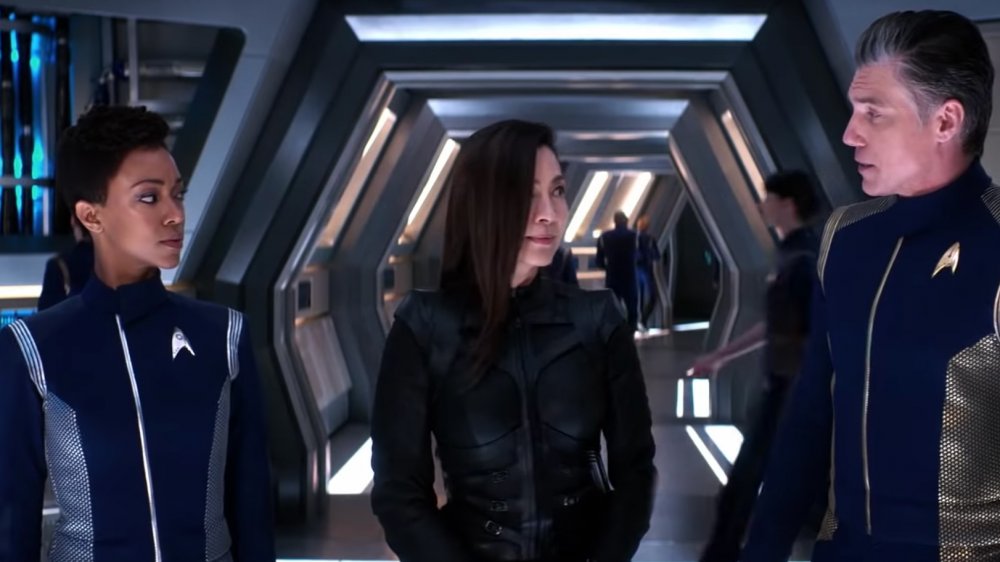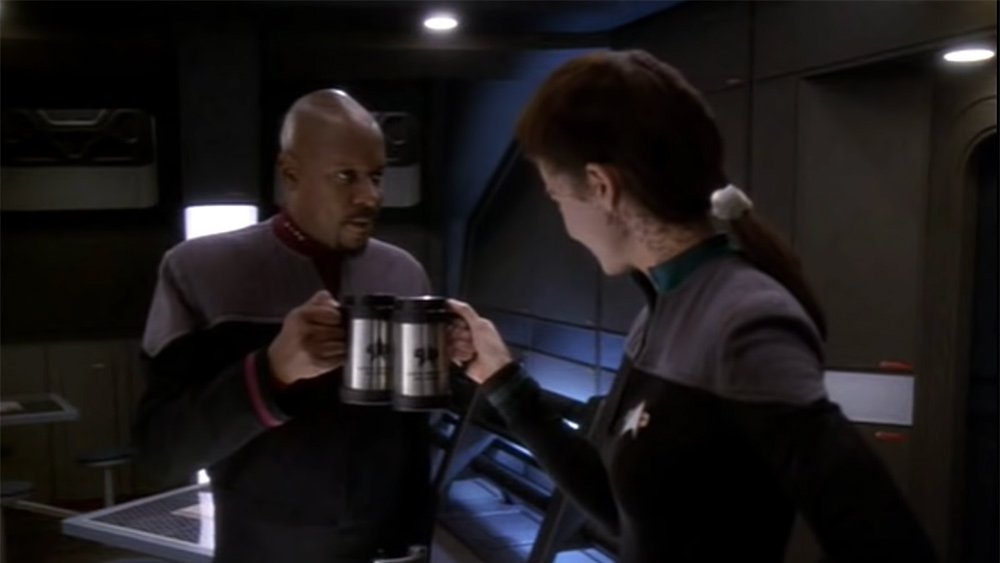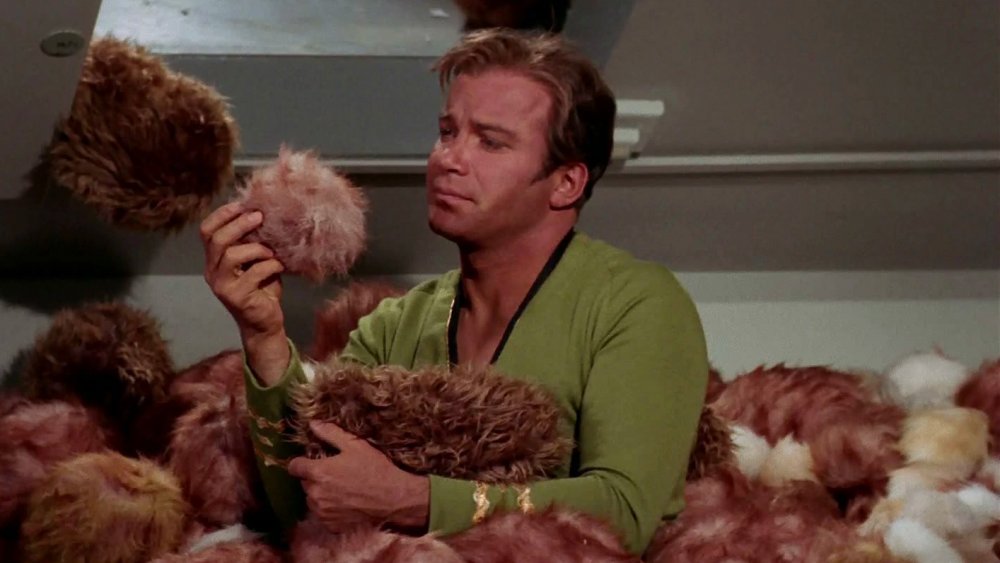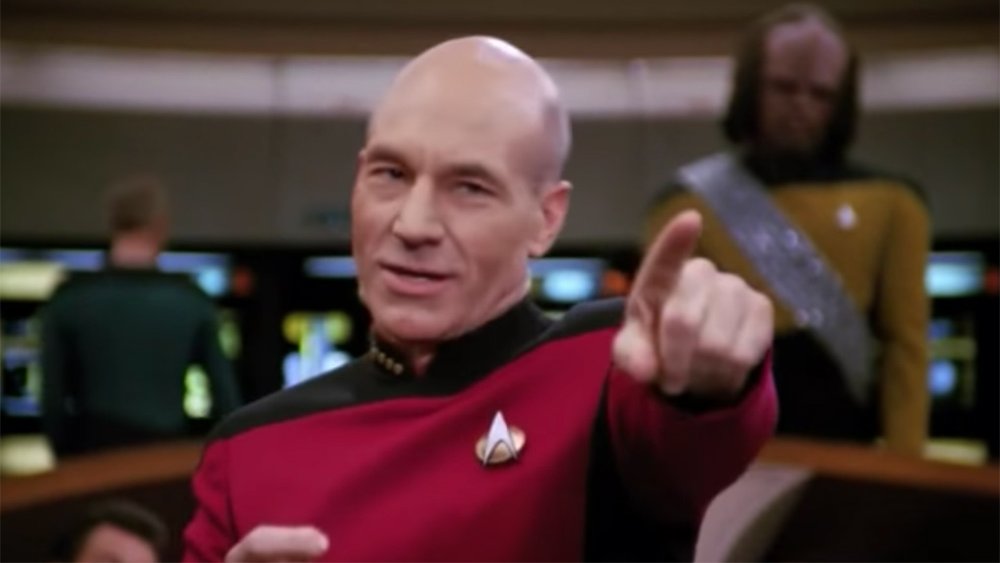Every Star Trek Show Ranked Worst To Best
Since the crew of the Enterprise first embarked on their mission in 1966, the Star Trek saga has spread out over 50 years of television. It's always been there, whether it was a thrilling new adventure every week or a well-worn classic, a syndicated rerun or the selling point of a brand-new streaming service. All told, it's over 700 episodes that range from some of the best television has ever had to offer to a handful of the absolute worst.
But while it's true every Star Trek series has its high points and rough patches, there are some that come out far, far better than the others. There are groundbreaking allegories, episodes that changed pop culture forever just by giving a character a goatee ... and a handful that made a journey through the final frontier seem unforgivably boring. As for which shows did it well and which just didn't, read on for a totally subjective ranking of every Star Trek show from worst to best.
Star Trek: Enterprise (2001 - 2005) was boring and suggestive
When the Next Generation era of Star Trek came to an end in 2001, Enterprise probably seemed like a really good idea. The franchise had, after all, spent over a decade chronicling what happened in the century after the original Star Trek, and since prequels were all the rage at the time, going back to show humanity's first steps into the depths of space was logical. What would it be like to take those voyages without all the sci-fi conveniences of transporters and universal translators? They even had the bright idea of casting Scott Bakula, already a sci-fi fan-favorite thanks to Quantum Leap, as the new captain.
Sadly, Enterprise proved the distance between "seemed" and "was" is so vast even warp speed can't get you there in four seasons. To be fair, the show eventually did get around to some solid storytelling. Perhaps surprisingly, it was at its best with plots about time travel and mirror universes, the themes that are often difficult to pull off well. The two-parter where they go back in time to fight Nazi aliens during World War II, for instance, is a hoot, and exactly the flavor of Star Trek's signature weirdness that led to TOS episodes about planets of 1930s mobsters or six-foot rabbits. Getting to those, however, is a trial. Despite its strong premise, Enterprise spent most of its run vacillating between bad and boring, and sometimes managed to be both at the same time.
The worst part, though, is the show is just embarrassingly horny, and for Star Trek, a franchise where there's Risa, a canonical sex planet where everyone goes whenever they're on vacation, that's saying something. Sex appeal had been a part of the show ever since green women were belly dancing for Captain Kirk back in the '60s, but Enterprise seemed like it wanted to double down on the success Voyager had with Seven of Nine by throwing in as many scenes of suggestive decontamination chamber rub-downs into those first few episodes as it could. It's not uncommon to think "this is definitely someone's thing" while watching Trek, but usually it's a little more subtle. Maybe that's why they had the whole thing turn out to be one of Riker's holodeck simulations in the finale. If anyone's going to program in some uncomfortable bathing scenes into a historical document, it's that dude.
Actually, no, strike that. The worst part is definitely the theme song.
Star Trek: The Animated Series (1973 - 1974) took too many shortcuts
Considering its eternal, enduring popularity has ensured some kind of Star Trek project has always been around, it's weird to think about those years between the end of the original series and the cast reuniting for Star Trek: The Motion Picture when there just... wasn't. Sure, TOS was a favorite in syndicated reruns — one of the major factors that led to the development of its die-hard cult of Trekker fans — but as far as new stories went, the decade between the end of TOS and the release of TMP was a wasteland.
Except, of course, for the 22-episode run of what would eventually be known as Star Trek: The Animated Series, which, to put it in the most charitable terms, is the methadone of Star Trek. The show got the green light thanks to Trek's post-cancellation success in syndication, and for all its flaws, it did some pretty interesting things. For one thing, it reunited almost all of the show's cast, giving it a sense of authenticity cartoon spinoffs usually lack. Even the one major cast member who wasn't brought back — poor Walter Koenig didn't make the cut — led to something interesting; Chekov was replaced by a handful of alien helmsmen whose designs would've been prohibitively difficult to pull off in live-action. There are even some good stories thrown in here. "More Tribbles, More Troubles," in addition to sounding like the track Biggie Smalls would've dropped if he'd been reading Starlog instead of Word Up, is a great spin on one of the most popular episodes of TOS. And while it's not great, "Yesteryear" gave the viewers who were demanding more details of Spock's childhood exactly what they wanted.
Unfortunately, overall the show is not very good. The animation is substandard even for the early '70s, clocking in somewhere south of Scooby Doo, and the shortcuts — like giving the crew invisible force-field spacesuits rather than designing a second character model — are obvious even for a kid. That cheap, repetitive animation also makes the 24-minute animated stories feel like they drag, even though they're half the length of a TOS episode. The best thing you can say about Star Trek: The Animated Series is it is technically Star Trek, which is slightly better than having no Trek at all.
Star Trek: Short Treks (2018 - Present) has potential
Short Treks feels like an idea that should've happened long before Star Trek finished out its first 50 years. One of the biggest strengths of Trek — as opposed to other major science fiction franchises — is it's always focused on the idea of a big universe. Sure, we tend to follow the crew of the various starships Enterprise, but there's an entire Federation around them composed of countless alien cultures, and if shows like Deep Space Nine have taught us anything, it's that the wider universe can be just as interesting as the missions seeking out all those new lives and civilizations.
And yet, with all the Trek shows, novels, and comics that spanned the first half-century, Short Treks was the first one explicitly meant to explore the universe outside our main characters. In that respect, it captures one of the best things about the franchise: it can be something different in every episode, from comedy to tense drama to allegory. On the other hand, it also suffers from the flaws inherent to every anthology: by its very nature, it's uneven, and while the lack of consistency can be interesting, it also means there's a variation in quality from episode to episode — which, unfortunately, isn't unique to Short Treks, and might be the worst thing about the franchise.
Despite that uneven nature, Short Treks is absolutely worth watching, and episodes like "The Escape Artist," in which Rainn Wilson both directs and stars as a handful of Harrys Mudd, feel like classic Trek. Also, as one of the newest Trek shows, and one that's still running as of 2020, there's plenty of time for it to get even better as the years go on.
Star Trek: Voyager (1995 - 2001) took forever to get good
In the broadest sense, there are basically two kinds of Star Trek episodes: the ones where the crew wanders into some weird, unexplored corner of space and has to deal with whatever nonsense they find there, and the more allegorical episodes about the difficulties of maintaining peace between planets in the final frontier. When TNG spun off into its successors, it seemed like each one picked one of those ideas to stick with for an entire series. Voyager, flung out into the depths of space, light years away from the familiar civilizations of the Federation, was the former. You'd think doing a show about a literal trek through the stars would make for a better Star Trek experience than a show that was stuck in the same place for seven seasons, but if Voyager's middling level of quality is anything to go by, it's a whole lot harder than it looks.
Maybe the problems came from the initial setup of having different factions among the crew, thrown together through necessity despite the fact they didn't fully trust each other. After decades of Gene Roddenberry's blanket ban on interpersonal conflict among the crew, that probably seemed like a fresh idea, and the premise of having to deal with the unknown both within the crew and without makes for a solid log line. In practice, though, it was adding one twist too many to the show. It's all summed up in the story about how the producers of Voyager hired a Native American consultant to help flesh out the character of Chakotay, who turned out to be a con man who was about as much of a Native American as Spock. The best of intentions with some pretty rough results.
Eventually, they got around to some good stuff, particularly once they were dealing with the Borg and having Seven of Nine get kidnapped into a gladiatorial arena where she fought Dwayne "The Rock" Johnson (season 6, episode 15, it rules), but the dull, plodding, meandering road to get there is barely worth it.
Star Trek: Discovery (2017 - Present) is on a roll
Setting a Star Trek show in the same general time period as the original Star Trek, even going as far as pulling in characters like Captain Christopher Pike and Harry Mudd and riffing on concepts like the Mirror Universe seems like the kind of hubris even Icarus would think was a little extreme. You're not only setting yourself up to be compared to the OG Star Trek, but to people's memories of the show and the very idea of it as a cornerstone of something they love — and as you might've heard, Star Trek fans can be a little intense. It would take a truly great show to pull that off... and it turns out Discovery actually is that good.
A big portion of that has to do with the fact — in the grandest Star Trek tradition — the cast of Discovery is an amazing collection of actors. Sonequa Martin-Green alone has the kind of charisma that could carry the show and single-handedly justify the change of focus from a captain as the main character to a (slightly) lower-ranking officer. That same choice also allowed Discovery to pull off another amazing bit of casting with Jason Isaacs — spoiler warning — but having the dude who played Lucius Malfoy in the Harry Potter movies spend half a season convincing everyone he's a good guy before revealing he's from the mirror universe is the kind of delightful should've-seen-it-coming twist Trek has never really pulled off before.
Throw in the rest of the cast — Michelle Yeoh on Star Trek is something we never knew we wanted so badly until someone found a magic lamp and wished it into existence — along with great visual designs and two seasons of solid writing, and you've got something great. The only question is whether or not Discovery will be able to maintain that level of quality for its whole run.
Star Trek: Deep Space Nine (1993 - 1999) took risks
If Voyager was the show that got lost in its years wandering around the galaxy, Deep Space Nine was the one that planted its roots and thrived to become one of the best Trek shows of all time.
More than anything else, DS9 was smart. In showing a side of the Star Trek universe that had never been seen before — a run-down, barely functioning rust-bucket of a space station rather than the ultra-sophisticated luxury liner of the galaxy that was the Enterprise-D — it made everything it did feel fresh. By positioning that space station around a planet that had only just been freed from an occupying military force, it explored ideas about the fragility of peace in a way the high-minded original series and TNG never had. By building a cast that included upright Federation officers, unabashedly sketchy crooks, and the people trying to rebuild from what seemed like an endless war, it had a character dynamic to which no other show came close.
Just look at Major Kira Nerys. She's one of the show's most heroic characters. She's also an insurgent freedom fighter described by several characters — including herself — as a terrorist. That her actions are presented with thoughtfulness and nuance, that they're influenced by real-world ideas without becoming a heavy-handed allegory, speaks to the level of sophistication that DS9 was working with from day one. Along the same lines is Jadzia Dax, who — because she's a symbiotic life form who was formerly bonded with another body — will casually mention that she used to be a man, which everyone around her accepts without any problem. Those are things that it's hard to imagine a show being able to do today, 20 years after DS9's final episode. It only gets better as the series goes on, with the Dominion forming a very different sort of antagonist than the Klingons, Romulans, or Borg.
Plus, listening to Avery Brooks deliver dialogue is the audio equivalent of wrapping yourself up in the warmest, coziest blanket you can imagine.
Star Trek (1966 - 1969) is classic for a reason
Looking back from the distant future of the 21st century, it's sometimes hard to believe that Star Trek's original run only lasted three seasons. Like... even Enterprise got four.
But what a three-season run it was. Sure, there are a handful of real stinkers in Trek's original run — "Spock's Brain" and "The Paradise Syndrome" manage to be cringe-worthy in completely different ways — but they're more than balanced out by the good stuff. That Trek was groundbreaking barely even needs to be said. That 90 percent of it still holds up after 50 years is pretty well-known. That it blended social commentary with pulpy, wild-west sci-fi action is one of the first things anyone's going to say about it. You already know why Star Trek is good.
So let's talk about something that rarely gets the spotlight it deserves: the acting. Star Trek's characters and the way the cast portrayed them were so iconic, influential, and familiar — thanks to both the omnipresent reruns of the series in the decades since its original run — that the broad strokes have been parodied countless times in the wider world of pop culture. You remember William Shatner's breathy, pause-heavy delivery, Leonard Nimoy's deadpan eyebrow, and James Doohan's wildly over-the-top Scottish accent. What often gets lost in all those parodies is that they're actually really good at what they do, making even the most ludicrously overwrought plot seem poignant and compelling. There's a reason the show got the fan-base that it did, and defined an entire side of science-fiction for the next 50 years.
Star Trek: The Next Generation (1987 - 1994) is more than meme fodder
In all honesty, Star Trek: The Next Generation probably shouldn't have made it at far as it did. Of its seven-season run, the first two are full of almost unbearably bad episodes, partly because the second happened during a writer strike that led to the show digging through rejected scripts from the '70s. Remember the one that's weirdly racist against the Irish? Or where Troi gets space pregnant against her will? Or that deadly conspiracy within Starfleet that's never really brought up again? It's rough stuff, and if you see those too-tight first-season uniforms or Dr. Pulaski, you're almost guaranteed to have a bad time. And then, somewhere in Season 3, something clicks, and suddenly it's one of the best shows in television history.
In a lot of ways, it's like the writing and production finally catch up with the cast. The one thing the show had going for it since day one — and the thing that really carried early-season high spots like "Q Who" and "The Measure of a Man" — was a truly incredible, lightning-in-a-bottle roster of actors that were all committed to making that show work. Without Patrick Stewart delivering a tour-de-force performance as Picard, Brent Spiner doing his level best to make Data's twee robotic nonsense seem charming instead of unforgivably annoying, or Jonathan Frakes treating chairs in his very strange way, the show never would've gotten the chance to become what it did.
Episodes like "The Best of Both Worlds" and "Chain of Command" set new watermarks for how good Trek could be at compelling, thrilling drama. "Rascals" and "Tapestry" proved that TNG could take a seemingly silly premise and pull it off. "Yesterday's Enterprise" and "Hollow Pursuits" took well-worn sci-fi tropes and made them feel fresh. The end result was a run of episodes where the good didn't just outweigh the bad, it obliterated it. Seriously, this is a show that includes "Sub Rosa," an episode where Beverly Crusher has sex with a ghost that used to bang her grandma, and it still has enough all-time great television that it averages out as the best Trek series of all time.
